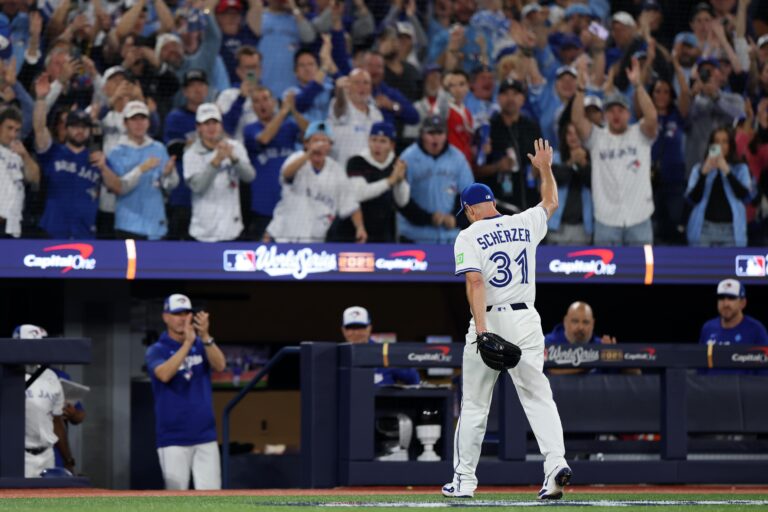Eleven years ago, when I was a college sophomore in Ann Arbor, Michigan, I made an impromptu drive to Detroit with four friends for the express purpose of seeing Max Scherzer. It was his final home start as a Tiger, and while I’d be lying if I said I remembered much of the game itself—I have a sharper recall of learning in the parking lot that Derek Jeter had walked it off in his last Yankee Stadium AB—what sticks with me most is that we’d made the effort. And somewhere along the line, I bound myself to Scherzer for the remainder of his career, even as that career took him out of Detroit.
He would leave in free agency for the Nationals. A 2014 playoff blowout at the hands of the Orioles and an ensuing three-game sweep would be the final playoff series for the Tigers for a decade. The last time I saw him, and the last time my hometown team was good, were tied together in my brain.
Eleven years later, I watched Game 7 by myself. I was emotionally exhausted for all sorts of reasons, but the game had a gravity that made my whole weekend revolve around it. I put some blankets and a pillow down on the floor a few feet in front of my bedroom TV, and I stayed there for hours and hours. Max Scherzer was starting. Both of us had a come a very long way. He doesn’t know I exist, but that’s the way of baseball—you give your emotional life over to a young man, and his triumphs become yours, and you march through your milestones in parallel.
Scherzer made his legend in D.C., spending the first half of his 30s cementing the “Mad Max” persona while he set new highs for innings, strikeouts, and intensity. Nats fans will tell you about the no-hitters, and the 20-K game (against the Tigers), and that time he pitched with a broken nose and a black eye. From afar, I admired the way he exuded such terrifying competitiveness on the mound without that venom seeming to spill over into his off-field life. His crowning achievement came just as I experienced my own professional turmoil; I watched Game 7 of the 2019 World Series in a now-defunct New York sports bar just hours after quitting the first job I ever loved. I was scared and disoriented and feeling a certain amount of alcoholic righteousness, and I saw Max Scherzer pitch the first five innings of a game that would clinch Washington a title.
A few years later, I shared a city with Scherzer again. He came to the Mets following a brief layover with the Dodgers, and he was the best pitcher, again, on a team that I embraced with reckless abandon. His body showed some signs of age, but he racked up plenty of vintage starts as well. On his 38th birthday, he pitched seven shutout innings in a win over the Yankees.
Then, more heartbreak. My long summer spent getting to know this team ended with the boys clotheslined by the Padres in a short series. Scherzer started Game 1 and allowed seven runs. After the team’s rough start to 2023 (Scherzer looking fine but not great), they opted for a retooling and sent him to the far-flung land of Texas. With the Rangers, he felt remote. I wanted him to be healthy and good, because I liked him, but I had no affection for his team. I assumed that he had hit the end of his road, a few years later than most pitchers do.
And then Scherzer signed with the Blue Jays for another run, the summer he’d turn 41. He started the year as an injured non-factor, scoring his first win on July 11. His starts did not have the longevity they used to—his opponents had a 1.073 OPS their third time through the order—but he proved himself enough to be a major-league pitcher on a first-place team. Barely. Some nights, that fastball-slider combo could still miss bats. Other nights, the bats clobbered him. Just before his regular season took a turn for the worse at the end of August, I got to see him in person one more time. I added an extra day to a trip to Toronto just to catch a Jays game, and fate rewarded me with a Scherzer start. His eyes were the same, if not much else. Since I’d last seen him pitch, we’d both changed our addresses several times and made some decent money (him more than me). He’d become a father. I’d fallen in love. Nearly everything about me had changed in those 11 years, but I could still text all those same friends and let them know I was seeing Scherzer again.
Max made it work, going into my scorecard as the winning pitcher in a 10-4 Blue Jays triumph. But after a couple of strong innings early, it seemed Minnesota was hitting him hard to right field every other at-bat. Those vulnerabilities got worse in his ensuing starts, bad enough that the Jays kept him off the mound in the playoffs until Game 4 of the ALCS. He was solid there, bolstering his psychopathic reputation by getting a strikeout immediately after dramatically refusing the give the ball to his manager on a fifth-inning mound visit. He was solid again in the first 4.1 innings of the 18-inning classic, departing Game 3 of the World Series with his team leading 4-2. And then came Game 7, maybe the coolest on-paper pitching matchup in baseball history. The most talented freak in the sport, Shohei Ohtani, went against the future hall of famer trying to pull one last job.
The day of Game 7, I was thinking a lot about Miguel Cabrera, the greatest hitter I ever rooted for, and how he ended his career playing year after year of stakes-free games in front of dwindling crowds who had to bring their own sentimental value to the ballpark to make it worth anything. Some legends finish like that, trying their best in a bad situation. While Justin Verlander hung out at home and Clayton Kershaw sat untouched in the visitors’ bullpen, Scherzer took the ball and did what was asked of him. He made it twice through the order, getting pulled only when he had to face Ohtani for the third time. Just like in Game 3, his team led by two runs when he exited. And just like in Game 3, the Dodgers won in extras, relegating Scherzer’s start to a footnote. The edge-of-your-seat (or blanket-on-the-floor) chaos of the final few hours made the start of the game feel like it came from another century altogether
Except to me. I spent Game 7 delirious, nauseated, dumbstruck, and ultimately grateful, even if I hated the way it had to end. But when I think about that game today, for some reason I keep thinking of Scherzer first, and the “real” heroes second. Like, sure, the Dodgers repeated as champs or whatever, but after 15 years of intersecting with him at various points of my life, I saw Max Scherzer pitch well in a Game 7 in the World Series. Whatever happens next in his career, we’ll have those innings.
Here’s something else I’m thinking about. Last year I saw a 26-year-old Yoshinobu Yamamoto start the only MLB playoff game I’ve ever seen live, a miserably cold outing to Queens for last year’s NLCS that I’ll nonetheless always remember fondly. In our first and only trip to Dodger Stadium, in April of this year, my brother and I saw Yamamoto duel Paul Skenes from high up by the foul pole in left. In September, my dad and I saw Yamamoto come within a few feet of a no-hitter in front of one of the year’s best Camden Yards crowds. And all this autumn, I watched him shine again and again en route to World Series MVP honors. I didn’t mean for any of this to happen, but my life is now linked to his career. Baseball takes away, and then it gives.


